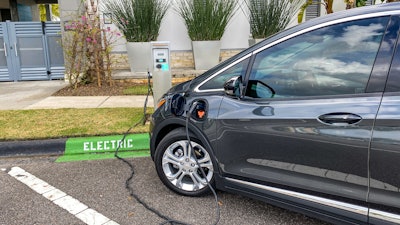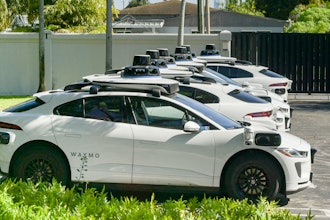
DETROIT (AP) — Despite taking on a huge chunk of an expensive electric vehicle recall, General Motors posted $2.54 billion in second-quarter net income, a 52% increase over a year ago.
Continued strong vehicle sales and pricing, as well as cost cuts, led to the better-than-expected quarter. The Detroit automaker on Tuesday raised its financial guidance for the full year with one qualification: that it can negotiate union labor contracts without a strike.
Chief Financial Officer Paul Jacobson told reporters that customers paid about $1,600 more per vehicle last quarter than from January through March — with an average U.S. sale price of $52,000. Discounts and inventory remained flat as the company sold 19% more vehicles than a year ago in the U.S., its most profitable market.
"We've had an ability and a willingness and a capability to remain disciplined in our pricing and our incentives," Jacobson said. "So while a lot of our competitors are moving prices around a lot, ours have been very consistent" reflecting strong consumer demand, he said.
GM raised its full-year guidance for the second straight quarter, saying it will post net income of between $9.3 billion and $10.7 billion. Previously it predicted $8.4 billion to $9.9 billion.
Also pushing up the guidance was another $1 billion in cost savings that Jacobson said GM had found, on top of $2 billion the company promised earlier for the full year. The savings came through lower salaried employee expenses due to 5,000 workers taking buyouts, as well as savings in marketing and reductions in administrative costs and vehicle manufacturing complexity.
The company took a one-time charge of $792 million as it picked up more of the $1.9 billion cost of recalling Chevrolet Bolt electric vehicles because they could catch fire due to battery manufacturing defects.
Jacobson said GM took extraordinary steps to care for Bolt owners by letting them trade in their cars and offering loaner vehicles until replacement batteries were available from the supplier, LG Energy Solution. The recall announced in 2021 covered about 142,000 vehicles.
CEO Mary Barra confirmed Tuesday that a new Bolt is in the works, which she said will be affordable and have great range and technology. No time frame was given for the car, but Barra said GM will bring it to market quickly. The Bolt, which starts at $26,500, is due to go out of production at the end of this year.
Excluding one-time items, GM said it made $1.91 per share, beating Wall Street's estimate of $1.87. Revenue of $44.75 billion soundly beat analysts' estimate of $42.13 billion, according to data provider FactSet.
Shares of GM fell slightly in trading before the opening bell to $39.22.
The company also said it met an internal target of producing 50,000 electric vehicles in North America during the first half of the year. With battery cell production and vehicle assembly increasing, GM now expects to build about 100,000 EVs in the second half of the year.
GM has set a goal of building only electric passenger vehicles by 2035. It has pledged to have 30 electric vehicle models for sale globally by 2025.
GM also said that cost savings allowed it to reduce the top end of its projection for capital spending this year. The company now expects to spend $11 billion to $12 billion, down from $11 billion to $13 billion.
Hitting its financial forecast numbers may be difficult because the company is in the middle of what are expected to be contentious negotiations with U.S. and Canadian auto workers.
United Auto Workers President Shawn Fain, who represents about 43,000 U.S. factory workers, has told members they are poised to make big gains in this year's contract talks, but they have to be prepared to go on strike against the profitable auto companies.
Contracts between the Detroit Three automakers and GM, Stellantis and Ford expire at 11:59 p.m. on Sept. 15.
Fain says the union wants cost of living and general pay raises, an end to tiers of workers making different wages, restoration of pensions for all workers, and other items. The company is leery of increasing its expenses as it ramps up to spend billions developing electric vehicles.
CEO Mary Barra said the company has a long history of negotiating fair contracts. "Our goal this time is no different," she wrote.






















